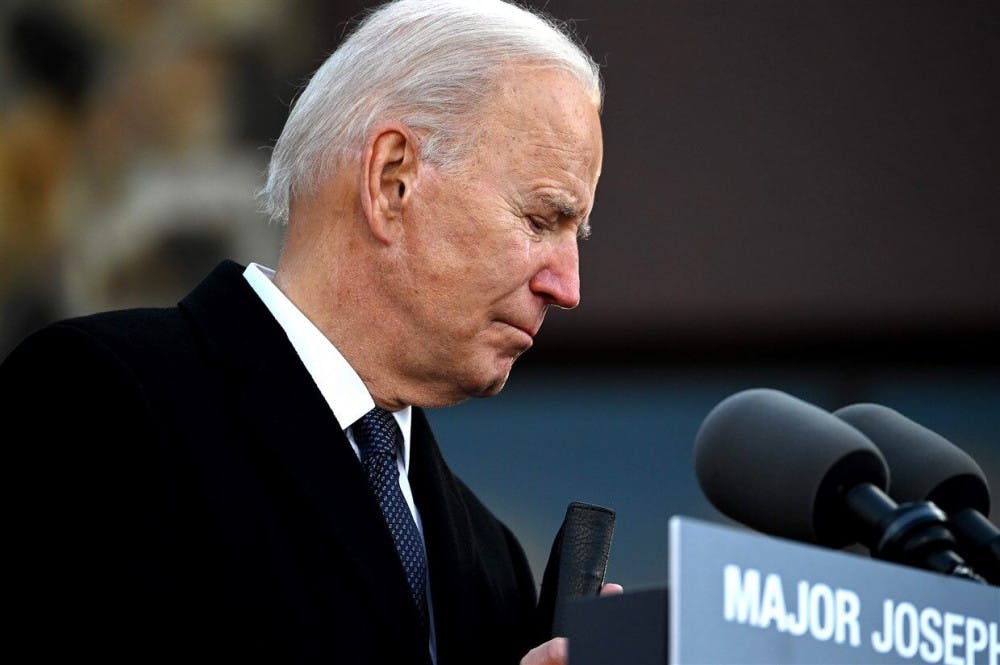On the eve of his inauguration, President Joe Biden stood behind a lectern that bore his late son’s name across the front, at a National Guard Reserve Center that also bore his name. Mere hours before he would place his hand on a family bible that was over a century old and take the oath of office, he stood in front of a group of supporters in Delaware to reflect on his journey and to thank the state as a whole. From the moment he took to the stage and began to speak, tears could be seen in his eyes.
They fell at his love for his adopted home state. They fell at his journey to the presidency. But they fell hardest at his loss. The loss of his son, Beau Biden, who died from brain cancer in 2015 has been a source of sadness and perseverance for the president and his family. President Biden, while on the campaign trail, expressed an understanding of loss as he empathized with families who had been impacted by the ongoing pandemic, but his tears last Tuesday were more than just proof that his empathy was more than a show.
Biden crying during a public address was far from the first occasion of the Commander-in-Chief shedding tears. In the wake of the Sandy Hook shooting, former President Barack Obama dropped his title to the highest public office in order to address the gathered press as a parent. As he stood before the crowded room, a stream of tears left his eyes.
Four years before President Obama’s moment of tears, President George W. Bush had his. While presenting the Medal of Honor to the parents of a fallen Navy SEAL, Michael A. Monsoor, who sacrificed his own life when he threw himself over a grenade to save the lives of the men around him. “Mr. and Mrs. Monsoor, America owes you a debt that can never be repaid," he said, cheeks shining with tears. "This nation will always cherish the memory of your son.”
The list goes on and on. Former President Gerald Ford cried during the 2000 Republican National Convention while listening to a tribute to his wife. Former President George H.W. Bush gave a tear-filled recollection of the moments that preceded the start of the air war against Iraq in 1999. President Dwight D. Eisenhower had to wipe his eyes with a handkerchief while he spoke on the campaign trail at an 82nd Airborne luncheon in 1952.
It is far too easy to believe that tears are signs of weakness. Some may see the images and videos from a president’s speech and say that emotions prevent him from performing his duties as mandated by the Constitution, but that is far from what they truly represent.
A president’s tears show a nation that tragedy is not the end. A president’s tears shine a light in the darkness. A president’s tears show empathy. It is easy for politicians to bolster an emotionless front, but it is exponentially more difficult to set aside politics in order to expose true, raw humanity.
A president’s tears are far from unique, but almost a day before even assuming the office, Biden displayed something that the former president simply did not do once during his four year tenure. President Elect Biden placed his loss before the American people and let tears fall. Then, hours after his departure from Delaware, he would visit the reflecting pool in the nation’s capitol where the losses of the American people were being honored and he empathized with us.
“To heal, we must remember,” he said that evening. “It’s hard, sometimes, to remember – but that’s how we heal. It’s important to do that as a nation, that’s why we are here today. Between sundown and dusk, let us shine the lights in the darkness along this sacred pool of reflection and remember all whom we have lost.”
In a time of such massive and tragic loss, a president’s tears mean more than an expression of emotion. They are signs of solidarity, of understanding, strength and – above all else – they should be noticed.
President Joe Biden sheds a few tears before a crowd in New Castle, Delaware. He would depart for Washington, D.C. shortly after his address last Tuesday.




